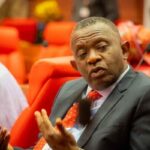In a significant boost to the operations of the Securities and Exchange Commission (SEC) and the Nigerian capital market, the Senate of the Federal Republic of Nigeria has passed the Investments and Securities Bill (ISB) 2024.
The ISB, which seeks to repeal the Securities and Exchange Commission Act, was passed on the Senate floor on Wednesday.
While announcing the passage of the Bill, Senate President Godswill Akpabio remarked that it would encourage more people to invest in the capital market by minimizing risks.
During the consideration of the committee’s report on the Bill, Senate Chief Whip Tahir Monguno emphasized that it would protect investors and eliminate fraudulent practices in the capital market.
Leading the debate, Chairman of the Senate Committee on Capital Market, Senator Osita Izunaso, explained that the Bill aimed to repeal the Investments and Securities Act of 2007 and enact the Investments and Securities Act 2024. According to him, the ISB is designed to transform the capital market, attract foreign investors, and boost investor confidence, among other benefits.
Izunaso stated:
“The Bill seeks to repeal the existing Investments and Securities Act of 2007 and establish new market infrastructure along with a comprehensive regulatory system for investments and securities businesses in Nigeria. This includes derivatives, systemic risk management, financial market infrastructure, and Ponzi schemes.”
He further explained that the Bill was intended to solidify the SEC’s role as the apex regulatory authority for the Nigerian capital market. It aims to promote capital formation, protect investors, maintain a fair and transparent market, and mitigate systemic risks.
Izunaso noted that the primary objective of the Bill was to align Nigeria’s capital market regulation with global standards by introducing an innovative regulatory framework.
“It will safeguard the integrity of the securities market against abuses such as insider trading and market manipulation. The Bill also aims to prevent unauthorized, illegal, and fraudulent trade practices in securities and investments.”
He added that the legislation seeks to strengthen the SEC’s capacity to fulfill its statutory mandate effectively and reposition the capital market as a vital sector for economic transformation.
Speaking recently, SEC Director-General Dr. Emomotimi Agama highlighted the Bill’s provision for harsher penalties against Ponzi scheme operators. The ISB mandates a minimum fine of ₦20 million or a prison term of up to 10 years, or both, for such offenses.
Agama explained that the Bill explicitly prohibits Ponzi and pyramid schemes, bolstering protections for investors against illegal fund managers. He added that it seeks to shield Nigerian investors from fraudulent schemes while enhancing the capital market’s global competitiveness.
A notable amendment in the Bill allows the Investor Protection Fund (IPF), established by securities exchanges, to cover investor losses related to the deregistration of brokerage firms, expanding its scope beyond bankruptcy or negligence cases.
Agama also stressed the need to update the ISB 2007 to reduce ambiguities and align Nigeria’s capital market regulations with international standards.
“The passage of this Bill will be pivotal in positioning Nigeria as a world-class capital market,” he stated, underscoring the critical role of a robust capital market in driving economic diversification.
The ISB 2024 also introduces regulatory frameworks for Commodity Exchanges and Warehouse Receipts, which are essential for developing Nigeria’s commodities sector.






